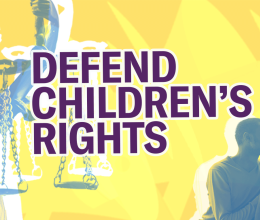
"No One Was Protecting Us" – Ransom Watkins Of The Exonerated Harlem Park 3
The transcript is available below.
Life in prison was the verdict for teenagers Ransom Watkins, Andrew Stewart, and Alfred Chestnut in 1983. They were wrongfully intimidated and interrogated by police and sentenced for a crime they did not commit.
The three were eventually exonerated but were effectively robbed of 36 years of life, in addition to the ever-present trauma that comes with incarceration. A devastating reminder of the issues within our legal justice system, and why children's rights must be protected.
Defending the rights of children shouldn't be optional, and yet every day in Maryland, children entangled in the legal justice system were questioned without a parent, guardian, or attorney present. Which is why in 2022, the ACLU of Maryland and our partners successfully passed the Child Interrogation Protection Act which requires an attorney be consulted before a child is interrogated by law enforcement.
On this episode, you'll hear from Ransom Watkins of the Exonerated Harlem Park Three about his life, legacy, and how the man in him still struggles with the brutality the child in him has endured.
Learn more about our 2024 legislative priorities, including defending children's due process rights.
Listen to the podcast on YouTube
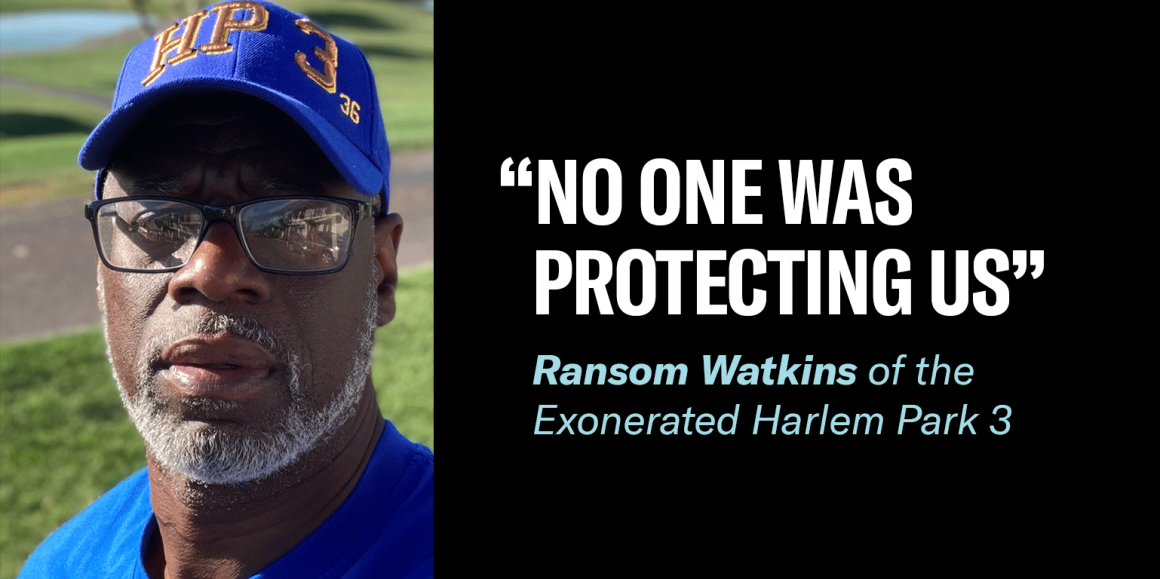
Producer and Host: Nehemiah Bester, communications strategist at ACLU of Maryland
This podcast was recorded on Piscataway land.
TRANSCRIPT
00:00 – 00:18
Ransom Watkins
You looking at kids who ain't been in trouble. So, for us, this is like a nightmare. You're in an uncomfortable environment without anybody that you know, and you don't have your parents. Because, you know, that's the first thing that kids ask for is their parents. So, with me, it was my father. Like where my father at? Cause you got me in a room by myself, and I need somebody in my family.
00:18 – 00:30
Ransom Watkins
Because I don't know what's going on. And I'm confused because I told you the truth. But you keep trying to get me to say something, that's not the truth.
00:33 – 00:40
Nehemiah Bester
You're listening to Thinking Freely with the ACLU of Maryland. The show that talks about what's happening politically in Maryland, from the courts to the streets and everywhere in between.
00:40 – 01:10
Nehemiah Bester
I'm your host Nehemiah Bester. Every day in Maryland, children entangled in the legal justice system were questioned without a parent, guardian, or attorney present. Because of this they have faced criminal charges, prosecution, and incarceration without the basic due process rights that adults are entitled to. This is made worse for Black, Indigenous, and Children of Color, who are over-policed, assumed to be less innocent, and made to seem less deserving of proper treatment under the law as children.
01:10 – 01:34
Nehemiah Bester
Take the case of the Exonerated Harlem Park Three – when in 1983, teenagers Alfred Chestnut, Andrew Stewart, and Ransom Watkins were wrongly arrested and interrogated by police without their parents, legal guardian, or attorney present. As a result, they were sentenced to life in prison for a murder they did not commit. The three spent 36 years each behind bars before being exonerated in 2019.
01:34 – 02:01
Nehemiah Bester
Their lives effectively stolen, even though they had done nothing wrong. Their story, and too many other examples are why, in 2022, the ACLU of Maryland and our partners successfully passed the Child Interrogation Protection Act. This law now requires an attorney be consulted before a child is interrogated by law enforcement. The law also requires that parents or guardians are notified when a child is taken into custody.
02:01 – 02:26
Nehemiah Bester
To me it seems pretty simple. Defending the rights of children should not be optional, and Ransom Watkins sat down to talk with me about it. Before we get into the conversation Ransom sent me some personal notes ahead of the interview that I’m going to share now with his permission. It goes like this: my name is Ransom Watkins. My childhood was taken from me when I was 16 years old.
02:26 – 02:50
Nehemiah Bester
I grew up in West Baltimore. I came from a poor family but with a million dollars’ worth of love. My mother passed away when I was 15 years old. She told me not to become what people want me to, I raised you as a loving son, don’t change for anybody. I did all I could to make my mother proud. I was a good kid.
02:50 – 03:13
Nehemiah Bester
One night in 1983 I woke up with guns in my face. The police snatched me out of bed and arrested me for murder. At the age of 16 years old I had to become a man. I lived my life through ups and downs, disappointments, and some really scary moments. I wondered if I would ever get out of prison. After 36 years of false incarceration,
03:13 – 03:34
Nehemiah Bester
I came home to a whole new world. Since that time, I have worked different jobs, got married, got my driver’s license, and bought my first car. Even though I live my life as a man, the child still struggles. Faith kept me strong.
03:34 – 03:56
Nehemiah Bester
So, I want to thank you, sir, for taking the time to talk with me today. It's truly a privilege to speak with you. I’ve been wanting to speak with you for a long time, actually. I know your story, and so I just really appreciate you being here and taking the time out. Can you tell me about the situation that happened when you were a teenager at Harlem Park Junior High?
03:56 – 04:21
Ransom Watkins
Yeah. In 1983, 16 years old. You know, life, just a kid that loved life. Me and my, my two best friends, Andrew Stewart, and Chestnut. That morning, we had went to Harlem Park Junior High to receive his jacket from his brother who wore it to school. But in the process of going in the school building, which we went to that school for three years.
04:21 – 04:47
Ransom Watkins
So personally, everybody knows us. But even though all of us was in high school. I live right across the street from the school, so everybody knows who we are. So, we went back that morning in 1983 to retrieve his jacket from his brother. But in the process of doing all that, being in the school, the security guard, had saw us which he knew us personally. You know what I’m saying he knew us personally. And we was walking around looking for the class.
04:47 – 05:03
Ransom Watkins
But at the same time, we kids so we were just acting like you know, like clowns. Everybody knows us so we joking with some of the people in the class. But when the security guard saw us, he was like, man, you know, y'all can't be in here. So imma have to ask y’all to leave imma escort y’all out the building.
05:03 – 05:29
Ransom Watkins
But we like ight Mr. Kelly ain't no problem. We cool with that because he knows us. And at the time, you know, we walking and we talking to him, and he escorted us off the premise. In the process, going through our whole day, we learned later on when we were back home that somebody had got killed in the school. Now, we were just as shocked as anybody else because nothing like that never really happened round our way in school.
05:30 – 05:51
Ransom Watkins
So, when we heard it, we were just shocked. We didn't know who it had happened to. Which for us, it didn't matter because we knew it was somebody young, you know. So, everybody was like, man, that’s messed up. But then we learned that it was a friend of ours named DeWitt Duckett, who also was a friend of the neighborhood. You know, everybody live in the neighbor, we are all just friends.
05:51 – 05:51
Nehemiah Bester
Yeah everybody knew each other.
05:51 – 06:12
Ransom Watkins
He was younger than us. But we speak, we know each other, and we found out that it was him, which basically just blew our mind. And through the course of that day that's all everybody talked about, about someone getting killed in the school. And then probably like three days or something later, the police come.
06:12 – 06:35
Ransom Watkins
We standing outside, by where we live it. The police just come and get us, you know, they ask us some questions, without our parents though. So, they knew they supposed to have our parents. But us looking up to police, like that's how I was raised. So, to me, I'm looking like they're going to do the right thing. They asking can they question us, oh yeah, sure I’ll go with you. I don’t really know that I’m supposed to have my parents but, they know that.
06:36 – 06:56
Ransom Watkins
But the way they got us is that they rode us around in the neighborhood, which basically letting other people see our face. That this was – as I got older, I come to find out this is what they used to do in the neighborhoods. They would put you in the back of the car, ride you around, let people see you.
06:56 – 07:16
Ransom Watkins
Right. And it's like a tactic that they use against kids, you know? But with us we not thinking like that because we kids, like they police man they gonna do the right thing. They just ask us questions, so we didn’t lie to them. Like was y’all up the school building? Yeah, we was up there early like about 11 o’clock, 12 o’clock.
07:18 – 07:36
Ransom Watkins
They said the murder happened around one, right? We wasn’t even in the building. But we never lied to them about being in the building. You know, if you trying to hide something you not gonna tell the people, whether somebody said you was in there or not you not going to agree to that. So, we just like, yes sir, you know, it was five of us and that's what we told him, the truth.
07:36 – 07:54
Ransom Watkins
It was five of us in the building. It wasn’t no three people. It was five of us together. So how y’all come out to three people? Y’all lying because we telling y’all that it was five of us and the other two guys that y'all didn't lock up is agreeing that they was in the building with us.
07:54 – 08:12
Ransom Watkins
So, it doesn't make sense for an individual to put they self on a homicide y’all say happened there and they know that they was with us that don’t even make sense. So, they never questioned other two guys that was with us. But the whole time they telling the police, man, we know they didn't do it because they was with us. If they did it, we did it.
08:12 – 08:33
Ransom Watkins
So why are we not in trouble? But unfortunately, man, I come to realize in this country, race played a lot of, played a big part in my case. You know, that was – once the news media got a hold of our case. Now, they had a witness from day one told the police who had done the murder, but he never investigated it.
08:33 – 08:55
Ransom Watkins
He said it was his privilege not to do so because he chose not to. But that's evidence they could have, could’ve cut us free right there. We wouldn't even have had to go to court. But they chose not to do that, right. And you know, it was, it’s tough man when you sixteen.
08:55 – 09:23
Nehemiah Bester
Of course and that – first, I'm sorry all that happened to you, Alfred, and Andrew. And for one you know, that sounds like very lazy policing, you know, not willing to go and investigate it. Can you tell me, how did you feel during that interrogation? Because you didn't have your parents with you. You know, in other cases, like folks, you know, if they don't have a parent or legal representation, they kind of are coerced into saying things. So how did you feel during that interrogation?
09:23 – 09:41
Ransom Watkins
Well first of all you looking at kids who ain't been in trouble. So, for us, this is like a nightmare. You’re in an uncomfortable environment without anybody that you know, and you don't have your parents. Because, you know, that's the first thing that kids ask for is their parents.
09:41 – 10:00
Ransom Watkins
So, with me, it was my father. Like where my father at? Cause you got me in a room by myself, and I need somebody in my family. Because I don’t know what’s going on. And I'm confused because I told you the truth. But you keep trying to get me to say something, that's not the truth.
10:02 – 10:20
Ransom Watkins
But I was built on that. Like my family, look, if you some you didn't do. I don't care what they try to - don’t you ever admit to something you didn't do. But if you did it then you stand up for it. So that's where I was at, in that room that police. No matter how much he tried to intimidate me, I wasn’t going to sit up there and tell you I killed somebody. I know I didn't kill nobody.
10:20 – 10:43
Ransom Watkins
Regardless of what you say, how much pressure you put on me, it’s not going to happen, right. Because that's how I was raised. But it was so intimidating to be in that room with him because everything he done in that room, he made it like ten times aggressive, like in your face. Like you know you did it.
10:44 – 11:03
Ransom Watkins
Sir I didn't do nothing, I’m telling you that I didn't do anything. Then they play the tactic game. Well, I just talked to Mr. Chestnut and Mr. Stewart, and they told me that you did it. So, I don't need no more testimony from you. Now, but I'm going to give you the opportunity to clear yourself. So, did they do it or did you do it?
11:03 – 11:06
Nehemiah Bester
Try to get you all to lie on each other.
11:06 – 11:20
Ransom Watkins
Right, and I'm telling them, like, man, listen, I didn't do it and they didn't do it. So, if sitting here telling me that they told you that they did it they lying. I'm not – I don't know what you said to them in that room, but they lying. They did not do it I was with them.
11:20 – 11:39
Ransom Watkins
I know they didn't. So that was a big thing in our case, right. And like none of us never, once, we always told the truth and we never deviated from the truth for 36 years. You know I'm saying like this, when you lie one thing you learn about a lie, you have to keep trying to remember what you said.
11:39 – 11:50
Ransom Watkins
Our case went along as no matter what you asked us from ‘83, from 36 years later, we're going to tell it to you like it was ’83. Because it was the truth.
11:50 – 11:52
Nehemiah Bester
It was consistent.
11:52 – 12:20
Ransom Watkins
We were consistent with everything that we were saying. And if you look at the transcripts or – see this the thing about the law. When you have Black judges who try to move up the ladder, such as my judge. Because you sealed evidence that could have – that could have stopped the trial, you sealed it. You are a judge of the court.
12:20 – 12:46
Ransom Watkins
You sworn to uphold law yourself. But yet that evidence that should have went to my lawyer, that could have stopped this trial, you sealed it. And nobody, and my lawyers and them never seen it. So, where's the fair justice at for kids in this country? If you have the judges and the prosecutors working together? I don't, I don't know how you get justice out of that, you know.
12:46 – 12:56
Ransom Watkins
So maybe some things need to be changed with the relationships with the judges and the prosecutors.
12:56 – 13:17
Nehemiah Bester
At the time, you know, this is 83 and 84. How do you think those relationships in the judicial system impacted your case specifically? They could withhold evidence which they did in our case in 83. Well, so because it seems to me like this was a huge rush to judgment.
13:17 – 13:29
Nehemiah Bester
Right? I remember reading that I think it took them 3 hours of deliberation before you all were convicted. Right. So, how did that - what was the impact of all of that?
13:29 – 13:41
Ransom Watkins
I think when you have like I tell people this, in a case like ours when you have publicized cases, people are, most people already made they judgment.
13:41 – 14:09
Ransom Watkins
People don't realize that. Because it was so, it was on news seven days a week, right. And if you constantly hearing about a young person getting killed and you seen it on news and then you’re picked as a juror, you already have formed an opinion about them kids, right. Nobody took into consideration that we was kids who ain’t never been in trouble, locked up or anything.
14:09 – 14:39
Ransom Watkins
Nobody took that into consideration. We come from poor backgrounds, but we had parents who loved us, which people overlook. We weren’t bad kids. We weren’t perfect kids, but we wasn’t bad kids neither, right. And I think with the system now, it’s going to be harder because like, imma give you a prime example. Like in our case, nobody gets punished for what happened to us for 36 years.
14:39 – 15:10
Ransom Watkins
Right? They pay you. But how is that punishment? So let me say this – if the police in the street know that he can fabricate evidence, right, and nothing will happen, he don't lose his job, he don't lose his pension, he don't do anything. What deter the officer behind him from stop doing the same thing? Nothing right? But if you start taking they pensions and letting them know that if you do this, you're going to be held accountable for this. We will punish you.
15:10 – 15:30
Ransom Watkins
If is not with jail time, we will take your pension. And I think that need to be done because nobody has been held accountable. Like in our case, yeah, you paid us off. But who actually paid for it? Our family, DeWitt Duckett family and us. Everybody else walked free. Everybody else get to still – like this police he still gets to see his kid graduate.
15:30 – 15:48
Ransom Watkins
He still gets to see his grandkids and everybody. So, he living a normal life, he ain't go through nothing. What do he care? So, what the state paid him, it didn’t come out of his, he's saying I'm good. I'm not paying. Right. But that's on the backs of taxpayers.
15:48 – 15:59
Ransom Watkins
That's who paying the price. But no one's seem to care about that. Because every time an officer do that, the taxpayers have to front that money somehow and that ain't fair to the people.
15:59 – 16:14
Nehemiah Bester
Yeah, and I think like, you know, that's one of the issues that we're facing right now. Like, what's the difference between justice and accountability? True justice is like you three would never have had to go through this at all.
16:14 – 16:38
Nehemiah Bester
And then the other part of that, officers not fully being held to account for what they did and how that impacts you and your friends and your families. Because you can't, there's no way to give back 36 years like you can't. That's not possible.
16:38 – 17:25
Ransom Watkins
Right, and they got to realize that man our families have suffered so much. Right, along with us. Like for us we never stopped suffering. The abuse that they dealt us as a child is with you for the rest of your life. Like I have seen so much as a child going into an adult system that people couldn't even imagine. Like that, that's hard like that stuff is always here. When you hear the screams, you remember all that. Your socializing with people is not as normal as person being in society. You know, your paranoia is outrageous because the environment that you've been in, that's all you knew.
17:25 – 17:27
Nehemiah Bester
Right, how do you get your mental health back?
17:27 – 17:49
Ransom Watkins
Right. And the first thing people are like you got your freedom – do I? So, you think cause you see me out here I’m smiling and I'm talking and I'm, but you don’t know what's going on here. And that's what people be missing that you really suffer bad, like you suffer. And then you feel like no one gets it, like they really don't get it.
17:49 – 18:06
Nehemiah Bester
Nah, and I think a lot of folks don’t understand that you have to reacclimate yourself back into society after you've been on the inside for so long. For a crime you didn't you never did in the first place.
18:06 – 18:26
Ransom Watkins
It’s not as easy as people make it seem. See what happened to you didn't happen over a year or two years. It happened for 36 years. So, you may not never reach that point where everything that's going on with you that you can fix. Because this didn't happen overnight. So, it's not going to end overnight. You know what I’m saying like this is going to be with you for your entire life.
18:26 – 18:42
Ransom Watkins
So, it’s a part of you and you go through it because sometimes you just don't want to, you just want to be alone. When you can't connect with your own family. Like that's just, man. People don't get it.
18:42 – 19:03
Nehemiah Bester
Ransom can you talk about how all of that has sort of like impacted your life today? Can you elaborate on like your routines, your lifestyle. How is what you've gone through for those 36 years – how has it impacted you? I mean on paper, you're free, but how has that impacted your life today? Can you talk about that?
19:03 – 19:30
Ransom Watkins
You really not because... I'm not an emotional type of being, you know, and I'm married. But I'm not that emotional person. I'm more of a paranoid person than anything. Right. When you can’t even go out to have a simple meal without doing, without being paranoid.
19:30 – 19:55
Ransom Watkins
This all the stuff that affects your life. Even when you driving. Certain jobs, you don't work because you don't feel comfortable in that environment. It’ll even go that far. Cause man I can't take that job because I can't. You know certain things like I got to keep moving. Like if I wanted an office job, can't do an office job, I got to keep my body moving at all time.
19:55 – 20:13
Ransom Watkins
So that affects you wanting to do some of the things that you want to do. I don't like to travel because I don't like to be in crowds. So that affects part of my marriage because my wife, she wants to travel. You know, and little things that we want to do. I'm just not big on going away.
20:13 – 20:34
Ransom Watkins
I'm more safer here than I am out there. Because in my mind, in prison I knew where I was at, I knew everybody, and I had that type of rapport with people where I didn't have to worry about violence. Right. So, all that for me was comfort. Now you took me from that setting and then you let me loose out here where I know nothing.
20:34 – 20:56
Ransom Watkins
Regular function technology that people take for granted. That kids know that we don't know. You know, these are the things that stop your life from going forward. So, in a sense, we stuck out here too. You know, people be like all you got to do is just, oh, just try to make - it’s hard when you can’t.
20:56 – 21:10
Ransom Watkins
People don’t understand it's hard to focus when your mind is going through so much. That you've been through so much that you can't even go to a restaurant and just have a normal dinner, without always…
21:10 – 21:14
Nehemiah Bester
Looking over your shoulder.
21:14 – 21:38
Ransom Watkins
Yeah, because everybody come in and do I need to see, and I need to sit where I can watch everybody. So, our life, our life is different out here. And it’s hard sometimes to ask for help. Because you're like, man, I would have known all this stuff if I was here. Then you feel some kind of, feel some kind of way because it's like they've done this to me. I didn't do this to them. And no apology. No, nothing. You're good, now.
21:38 – 22:02
Ransom Watkins
No therapy. I got to get my own therapy: you know I had to get my own therapy. Whatever it is that I had to get, I had to get with people to help me to maneuver around that. I had to get my driver's license, I had to give him a Social Security number. But had I not had help I wouldn't have done none of that, imma be honest with you. I wouldn’t because my paranoia wouldn't even allow me to go forward to take them steps.
22:02 – 22:29
Ransom Watkins
So, without having people pushing me to do that, it’d be like I still be in a cell. It's harsh man, its harsh that they get away with it. It’s harsh that they do it. You know? And they need to come to the table. I don't never think you can correct the system because the system is too corrupt. I don't know how you correct that.
22:29 – 22:59
Ransom Watkins
I've been, me and my brothers we've been talking about it. How do you correct when you have a judge who have knowledge of evidence and he don't give it to my lawyer? How do you correct that when they find out years later and they can’t do nothing to the judge because he retired. So how do you correct it? I don't know. But I know I'm not the only one. I know we're not the only ones that that happened to.
22:59 – 23:12
Nehemiah Bester
Right, it’s very systemic. And on the systemic part of it, this like you just said, you're not the only ones to have gone through this. And unfortunately, you all might not be the last to have gone through it.
23:12 – 23:40
Nehemiah Bester
You all were kids when this happened and even today, like, you know, Black and Brown kids are still being stopped and interrogated without their parent or a legal guardian present. Even though, like, you know, the Child Interrogation Act was passed. And so, I want to ask you, why do you feel it's important that children are protected from situations like that? Why do you feel like that act is important and why and why children's rights in general must be protected?
23:40 – 24:06
Ransom Watkins
Well, I always go back to myself as a child. See if my rights had been protected back then, I wouldn’t, we wouldn't be sitting here now. See that's the fault of that because of that, that's why we are sitting here. No one was protecting us back then.
24:06 – 24:35
Ransom Watkins
But see now you have laws in place for that. That's what people have to look at. In our case, somebody could have stepped up. Said listen, these are juveniles. We think they should have their parents. But I had a detective named Detective Kincaid and he was what I call cocky. He’d do things his way and he made it clear, I don’t need their parents.
24:35 – 25:05
Ransom Watkins
He made that real clear. Imma question them with their parents or without their parents. But you need that on the books to protect the child. You really do. Because somebody's going to be held accountable some kind of way, you know? But if you know that on the books, no one could be held accountable for it. So, I think that is very important that that's always on the books.
25:05 – 25:31
Ransom Watkins
Yeah, that's you know, that's number one. In order for a child to have some type of parent or guardian, there with them when they’re being questioned by anybody, you know. Yeah, I think that's very important. It would have helped us. One hundred percent it would have helped us because my parents would have been there. But because they knew that they didn't have to call them, and they understood that.
25:31 – 25:54
Ransom Watkins
So, with that, they got away with it, right. But had that been on the books, had that been a part of that case, then in this case would have never reached this far. So, you most definitely need that there. But I come to find that, I think we need to have some more stiff laws on the books for the children because man listen.
25:54 – 26:25
Ransom Watkins
You got to protect the children. We got to. You know, there's children being abused and there’s children being taken advantage of, and I just think having them laws on the books protects, it protects the children.
26:11 – 26:28
Nehemiah Bester
And it opens a window of further accountability where we can, because then you have more avenues where officers who do commit these interrogations to teenagers and children, okay, we have this law in place you can be held accountable.
26:28 – 26:48
Nehemiah Bester
I want to end on like a lighter note if that's okay. I know, you've done since you got out, you've done, like, tremendous work in your community. You know lot of philanthropic stuff, a lot of extracurricular activities. Can you just talk about how, you know, all the amazing work that you've done in your community, some of your favorite hobbies. You know, just how has your community - how have you been an asset to your community since you've been out?
26:58 – 27:11
Ransom Watkins
Oh, man, I've been man I’ve been listen, that's one thing I'm like, I'm big on. I'm big on giving back. And before I had got hurt on my job, doing a job I had tore my rotator cuff in five places and they had to put a plate in my neck.
27:11 – 27:36
Ransom Watkins
But before that I was doing volunteer work on this farm with kids. And we'd take inner city kids to the farm, and they’d ride horses. Because the horse can communicate with a kid the way that we don't even understanding. Horses are smart and I’ve been loving horses my whole life. But I had this one little girl who come from the inner city, and she’s been abused a lot.
27:36 – 27:59
Ransom Watkins
She like about nine, she don't talk. Listen this little girl, she was at the program before I got there, and she never talked to nobody. So that night was my night to get her, and I just walked the horse. I’m holding onto the horse, she riding the horse. I ain’t say nothing because I'm letting her get the feel of it.
27:59 – 28:20
Ransom Watkins
She's looking at me like, then she’ll turn her head look at me again. So, I’m like I got to find a way to communicate with her, so I use school. I say, what's your best subject in school? So, she like math. I'm like, oh, you're really smart in math? She said I think I'm really good. I said, okay, just lil numbers.
28:20 – 28:40
Ransom Watkins
How much is four plus five? And she’ll tell me. Oh, you really smart that is so good of you. I said, listen, I'm so proud of you. But man, imma tell you how that changed my life. Because during the course of that time I spent with that little girl, this was the amazing thing. This girl, don’t hug nobody, she don’t do none of that.
28:40 – 29:08
Ransom Watkins
And I left the program because I got hurt. And when I come back, she saw me, man, that little girl came running to me and hugged me. It's the little things like that. People don't understand that means everything. When you touch somebody that people that been around this kid for all this time couldn't touch. And it's like we made a connection, you know, I didn't push it, I just let it happen.
29:08 – 29:26
Ransom Watkins
But that was the most amazing thing to me. You know, I do a lot of volunteering you know, I do a lot of volunteering and I take care of a lot of kids. Like, I just give kids’ stuff, you know, I just buy stuff for kids. Just give it to them.
29:26 – 29:49
Ransom Watkins
For my community, we got a recreation center, where I donated a snowball machine last summer because, you know, they was like they needed one. Yeah. So, this it’s just the little things that you do to help out your community that people don't think mean a lot you know? So, I really want to buy them this summer, I want to get all them roller skates and I want to donate them to the recreation center that I was raised in. Even though the city wants to shut them all down.
29:49 – 30:00
Ransom Watkins
But if they try to shut this one down, I'm planning to try to work hard to keep it open because it really meant a lot to me as a child. So, I want to keep that going.
30:00 – 30:02
Nehemiah Bester
Yeah, it'll mean something to somebody else.
30:02 – 30:47
Ransom Watkins
Yeah, yeah, it’s my life goal man just to give back, it’s my life goal I don’t need much. But to put smiles on other people faces and kids’ faces, it means the world to me. Let me say one thing before I go. DeWitt Duckett, his mother, right? Because she lost a child. And I say this man you know, with all sincerity, I keep her in my prayers. Because this woman went 36 years believing that her son murderer was caught. Then come to find out 36 years later that they wasn’t. We weren’t the ones who did it.
30:47 – 31:12
Ransom Watkins
But she stated that she don't believe that right. I don't fault her for that bruh. I understand it's a mother that’s morning for her child. And she’s hurting, she got to believe something in order to keep going. But I want people to know man, that listen, I love DeWitt mother, always will and will continue to pray for her. You know and hoping that one day she can just face the truth for what it is.
31:12 – 31:33
Ransom Watkins
But if she never face it, man, I still want God to let her go in peace. You know, yeah, I'm big on that man, and I just want his mother to have some type of comfort because it mean a lot to me man. You know, I don't care about her not recognizing us.
31:33 – 31:45
Ransom Watkins
Y'all the ones who killed my son. If that's what you want to believe, in order for your life to function then you go ahead. But I want you to know that I'm going to continue to pray for her and keep my spirits man, yeah.
31:45 – 31:52
Nehemiah Bester
I mean, listen, this is obviously our first-time meeting, right? And I feel like this brought so much light to my day.
31:52 – 32:13
Nehemiah Bester
You know, it’s just awesome to hear that you’re bringing so much more light to your community. And I just I mean, I feel very honored to speak with you. It's been wonderful listening to and seeing your humanity and just knowing that you've had so much taken from you, and yet you still are offering so much to give back.
32:13 – 32:40
Nehemiah Bester
You know, I think that's just very beautiful to see. So just thank you Ransom for talking with me and sharing your story today.
32:20 – 32:30
Ransom Watkins
I appreciate it, man. Any time you want to talk to me, man, you know, hit me up, man. I'm here.
32:30 – 32:41
Nehemiah Bester
Thanks for joining us on this episode of Thinking Freely. If you enjoyed this conversation, please feel free to leave a like, comment, and share to your networks.
32:41 – 33:06
Nehemiah Bester
And if you want to learn more about defending children’s rights go to aclu-md.org. And finally, don’t forget to subscribe to Thinking Freely wherever you get your podcast. This show was recorded on Piscataway land. I’m Nehemiah Bester, the host and producer of Thinking Freely. See y’all next time.
Thinking Freely, ACLU of Maryland's podcast, informs Marylanders about what's happening politically – from the courts to the streets – so they can get involved and realize a more equitable Maryland for all.
SUBSCRIBE ON:
Apple Podcast | Spotify | SoundCloud | Stitcher | Listen Notes | RadioPublic | Pandora
Related content


ACLU of Maryland's Advocacy in the 2024 General Assembly
December 15, 2023Children's Rights
October 11, 2017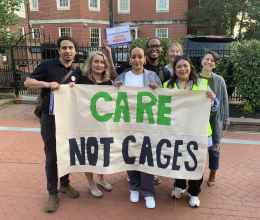
Veto HB 814 – Care Not Cages for Children Rally
April 18, 2024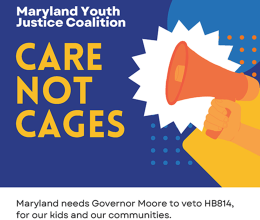
Veto HB 814 – Care Not Cages for Children
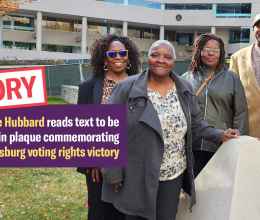
Landmark Federalsburg Voting Rights Settlement Plaque Reading by...
April 10, 2024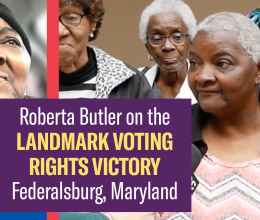
Roberta Butler on the Landmark Voting Rights Victory in...
April 3, 2024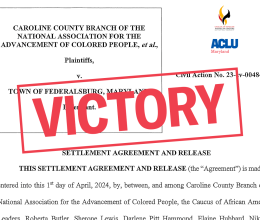
Landmark Settlement, with Sweeping Array of Restorative Measures,...
April 3, 2024